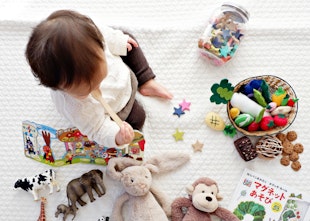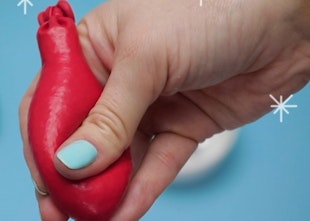If you thought it was exciting to see your baby smile that first gummy grin, just wait until you hear the first laugh. Wondering when it’s going to happen? If baby’s cooing and gurgling, it may be soon! These early noises are their way of experimenting with their voice and sounds and learning how to move their mouth and tongue.
If you thought it was exciting to see your baby smile that first gummy grin, just wait until you hear the first laugh. Wondering when it’s going to happen? If baby’s cooing and gurgling, it may be soon!
These early noises are their way of experimenting with their voice and sounds and learning how to move their mouth and tongue.
Laughter is such a lovely milestone to reach. Laughter is a way your baby communicates that you can understand. It’s a sign that your baby is alert, intrigued, and happy.
When should your baby start to laugh?
Most babies will begin laughing around month three or four. However, don’t be concerned if your baby isn’t laughing at four months. Each baby is different. Some babies will laugh earlier than others.
Ways to encourage that first laugh:
Your baby’s first laugh may happen when you kiss their belly, make a funny noise, or bounce them up and down. There are also other techniques to draw out a laugh from your little one.
Funny noises
Your baby may respond to kissing sounds, a squeaky voice, or blowing your lips together. These auditory cues are often more interesting than a normal voice.
Gentle touches
Light tickling or gently blowing on your baby’s skin is a fun, different sensation for them. Kissing their hands or feet, or “blowing a raspberry” on their belly may encourage a laugh, too.
Noisemakers
Objects in your baby’s environment, such as a rattle or a bell, may seem funny to your baby. You won’t know what these are until your baby laughs, but try using different noisemakers to see what makes them laugh.
Fun games
Peek-a-boo is a great game to play when children start laughing. (A favourite in our house). You can play peek-a-boo with your baby at any age, but they may not respond by laughing until they are four to six months. At this age, babies begin learning about “object permanence,” or the understanding that something exists even when you don’t see it.
What to do if your baby isn’t laughing?
If your baby hasn’t laughed yet within the traditional time frame, don’t worry-Babies develop at their own pace, and it’s perfectly normal for some to start later. And like with baby’s first smile, remember that some babies are just more serious than others. It may also take a while to figure out what baby finds humorous. Keep pulling different tricks out of the bag, something is bound to trigger that funny bone sooner or later.
Not laughing before age one isn’t necessarily a concern, studies show, as long as baby is cooing, smiling and generally interacting in a social way with others. But if you do have any concerns, don’t hesitate to bring them up with your doctor at your baby’s next check-up.
Written by Laura Doyle staff writer at FFHQ who also blogs at www.lovelifeandlittleones.com.






